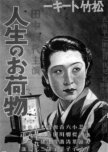"Women are like products for sale"
Burden of Life was a short Gosho Heinosuke film from 1935. Not going to sugar coat this one. I hated it. Even taking into account the time period, it was so overtly sexist that it made my blood boil.
There might be a couple of elements below that could be considered spoilery:
The film starts out safely enough (sort of) with a playful bantering of the sexes. Itsuko is the middle sister married to an artist who paints semi-nude portraits of her. They live beyond their means and rely on her parents helping them out with money. Oldest daughter Takako is married to Tetsuo and are always fighting. He disapproves of her buying anything for herself, yet he spends his time in hostess bars drinking and buying drinks for the hostesses. Machiko, the youngest daughter, is about to be married which is costing her dad more money. Nine-year-old Kanichi is the baby of the family. He stays away from his dad as much as possible, even eating dinner in the kitchen to avoid him. Shozo has nothing good to say about the boy. His mantra is, “We never should have had him.” Finally, the mother has had enough and begs the father to be kinder to him and plan for the son’s future as well.
I’ve watched numerous older films, but the gaslighting of the mom to prove that the father knew best and women were overly emotional was too much for me. There appeared to be a tiny softening of Shozo near the end but it was not nearly enough for me to accept any real character growth. I found the father’s attitude deeply disturbing. Shozo didn’t know Kanichi’s age and had no plans for the boy to be educated. He considered the boy too short and too ugly to ever be married. Surprisingly, this was one of the first times I’ve come across a father wanting to be rid of a son. Daughters were often lambasted as being useless, but sons always seemed to be coveted. Shozo’s domineering attitude toward his wife had me hoping she’d smother him with her pillow while he slept. He kept saying he wished Kanichi had never been born, being as brilliant as he was, surely he knew how babies were made, didn’t he?
Despite the age of the film and knowing attitudes have changed in the last nearly 100 years, I could not enjoy this film at all. Other early directors had a modicum of respect for their female characters and audience. A child being continually rejected by his father destroyed any enjoyment I might have had with this film otherwise. If you are a fan of Gosho or can tolerate bad parenting and dismissive attitudes for women, at 67 minutes it’s worth a try. I gave myself a day to think about it and try to rationalize the father/husband’s behaviors and the neighbors’ but am still mad. Given this was supposed to be a lighthearted slice of life, I don’t think that’s the response Gosho was trying to elicit.
17 November 2024
There might be a couple of elements below that could be considered spoilery:
The film starts out safely enough (sort of) with a playful bantering of the sexes. Itsuko is the middle sister married to an artist who paints semi-nude portraits of her. They live beyond their means and rely on her parents helping them out with money. Oldest daughter Takako is married to Tetsuo and are always fighting. He disapproves of her buying anything for herself, yet he spends his time in hostess bars drinking and buying drinks for the hostesses. Machiko, the youngest daughter, is about to be married which is costing her dad more money. Nine-year-old Kanichi is the baby of the family. He stays away from his dad as much as possible, even eating dinner in the kitchen to avoid him. Shozo has nothing good to say about the boy. His mantra is, “We never should have had him.” Finally, the mother has had enough and begs the father to be kinder to him and plan for the son’s future as well.
I’ve watched numerous older films, but the gaslighting of the mom to prove that the father knew best and women were overly emotional was too much for me. There appeared to be a tiny softening of Shozo near the end but it was not nearly enough for me to accept any real character growth. I found the father’s attitude deeply disturbing. Shozo didn’t know Kanichi’s age and had no plans for the boy to be educated. He considered the boy too short and too ugly to ever be married. Surprisingly, this was one of the first times I’ve come across a father wanting to be rid of a son. Daughters were often lambasted as being useless, but sons always seemed to be coveted. Shozo’s domineering attitude toward his wife had me hoping she’d smother him with her pillow while he slept. He kept saying he wished Kanichi had never been born, being as brilliant as he was, surely he knew how babies were made, didn’t he?
Despite the age of the film and knowing attitudes have changed in the last nearly 100 years, I could not enjoy this film at all. Other early directors had a modicum of respect for their female characters and audience. A child being continually rejected by his father destroyed any enjoyment I might have had with this film otherwise. If you are a fan of Gosho or can tolerate bad parenting and dismissive attitudes for women, at 67 minutes it’s worth a try. I gave myself a day to think about it and try to rationalize the father/husband’s behaviors and the neighbors’ but am still mad. Given this was supposed to be a lighthearted slice of life, I don’t think that’s the response Gosho was trying to elicit.
17 November 2024
Considerați utilă această recenzie?

 55
55 202
202 11
11























